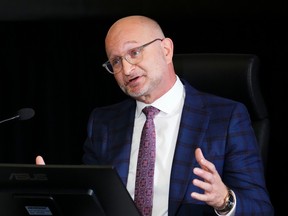We cannot support suicide prevention and suicide assistance as equally viable options for those with mental illness. It simply isn’t possible.

When the Senate, an unelected body, introduced a clause into its Medical Assistance in Dying legislation (MAiD) that added mental illness as a qualifying factor, it showed a deep disconnect from the people of Canada and a lack of care for those who suffer from mental illness. Since then, psychiatrists, psychologists and thousands of Canadians have called for a stop to this madness. It seems the federal government is finally listening.
Just before the new year, the Liberal government announced plans to delay the expansion of MAiD to those with mental illness that is set to come into effect in March. Last week it announced it will introduce legislation to delay this by one year.
Sign up to receive daily headline news from Ottawa Citizen, a division of Postmedia Network Inc.
Thanks for signing up!
A welcome email is on its way. If you don't see it, please check your junk folder.
The next issue of Ottawa Citizen Headline News will soon be in your inbox.
This planned delay is a much-needed piece of the puzzle as we work to build in real support for Canadians with mental illness. The delay itself won’t solve the problem, though. It needs to be followed by an actual removal of the Criminal Code provision that allows this expansion.
We cannot support suicide prevention and suicide assistance as equally viable options for those with mental illness. It simply isn’t possible. It would make us like the bad boyfriend who cries “don’t leave me” on Tuesday while raising a fist to send you through the door on Wednesday. It is deeply twisted to try to hold both these options as truths and will result in certain miscommunication and abuse.
Mental illness has many similarities to physical illness: both impact your ability to work, your energy levels and your relationships. But they also have some crucial differences. A broken bone is a broken bone, and the treatment plan is predictable. Mental illness, though, can vary widely from person to person. Six people with the same diagnosis may experience their symptoms very differently, making diagnosis difficult in the first place and treatment even more difficult moving forward.
Blowing your nose, clutching your stomach, hopping on crutches or navigating in a wheelchair all send immediate signals to those around you that you are dealing with symptoms. But holding back the waves of a panic attack, struggling to get going due to depression, or fighting PTSD nightmares are generally invisible to a watching world. Even those who have similar disorders cannot always understand your symptoms or experience. If we open MAiD to those struggling this way, we are saying it is not worth trying to understand.
Mental illness is also fundamentally different from physical illness in that its trajectory is unpredictable. “Reasonably foreseeable death,” a common term in MAiD assessments, does not exist in the world of mental illness. Many people struggle off and on with mental illness in varying intensity throughout their lives, but it is not going to cause any kind of predictable death.
As a country, we have made great strides in reducing stigma around mental illness. People now speak openly about their struggles with mental illness, their visits to a counsellor, and the value of people in their life who tell them to stay. Crisis lines and support groups exist for a variety of ages, languages and circumstances. Suicide prevention is a priority as we seek to make all people feel valued for who they are, regardless of anything else.
It hardly needs to be said that many mental illnesses, especially the entrenched, long-enduring disorders that MAiD seekers are likely to have, often include the symptom of suicidal ideation. Doctors who have already helped hundreds of patients with physical diseases die might, by March 2024, be legally able to take the lives of these individuals.
We need an act of Parliament to change this. A new bill needs to be introduced that will remove the current Criminal Code provision for the expansion of MAiD altogether, not just delay it. That bill will have to pass through the House of Commons quickly, but then also through the Senate, which pushed for this expansion in the first place.
In a country that is working to break down the stigma around mental illness, this is an opportunity for the federal government to take a meaningful stand for suicide prevention, not suicide assistance. It needs to take a stand soon.
Anna Nienhuis has a BA in psychology and works as a policy analyst for ARPA Canada, a grassroots Christian political advocacy organization. Her research focus is on elder care, palliative care and euthanasia.
-

Opinion: Answering the difficult questions about drug safety
-

Jennings: Why Ottawa's Wellington Street must reopen


